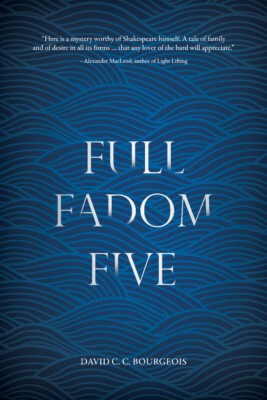Our contemporary culture loves categories, yet some of the best fiction defies easy classification. Such is the case with David C.C. Bourgeois’ Full Fadom Five. Bourgeois’ accomplished debut is a literary novel and a thriller, a romance and a historical novel, a dark satire and a witty comedy.
Noah Lamarck’s life is in freefall after a tsunami of hard knocks: he’s estranged from his wife and is a largely absent father to his ten-year-old son, Felix. The grandparents who raised him in Cape Breton are struggling with grand-dad’s dementia, not to mention significant financial woes. After relocating to Toronto to help his wife care for Felix, Noah is laid off from his job at the Fisher Rare Book Library. What’s more, questions have haunted him for three decades about the mystery surrounding his parents’ untimely deaths: he knows how they died, just not why.
“The dead alone are safe, and the safe already dead,” he muses. “For years, Noah had crafted an idea of who his father was, or might have been. Having so long worried it round and smooth, like a soft stone under his thumb, he was not prepared for the hard and faceted shape of the real thing.”
Full Fadom Five Baraka Books
David C.C. Bourgeois
$29.95
paper
344pp
9781771863124
Bourgeois deftly handles shifts in time and place, straddling the turn of the millennium all the way back to the English Renaissance, spanning the shores of Cape Breton to the bustling streets of Toronto. He creates a compelling cast of characters and brings each of his settings to visceral life. Capturing the rhythms of his characters’ speech, the dialogue sings; it’s no wonder that this author is a playwright and poet. There’s plenty of sly banter: “Men were a lot like metaphors,” muses Cecilia, “even when they said exactly what you wanted, somehow they didn’t.” Bourgeois demonstrates impressive range and versatility with language, equally at home with contemporary locution, Elizabethan English, and the prose of the King James Bible.
At times, Bourgeois’ passion for language results in overwriting – a five-dollar word where a fifty-cent word would do, to paraphrase Mark Twain – and an unnecessary profusion of detail in certain scenes, which unfortunately slows the pace of this ambitious story.
To the author’s credit, Full Fadom Five tackles timely and timeless themes: the impact of buried family secrets and intergenerational trauma, what we retrieve from the past and what we leave behind. The iterations of appetite and desire in all of their shapes and forms are primal. In fact, in the world of this novel, language and books possess erotic power analogous to female seductive power and fertility. “Great books don’t give it up all at once,” says a predatory professor to Cecilia. “The way they every time catch your breath. It was a kind of fecundity.”
One sustaining takeaway from Full Fadom Five: the past is never past. Bourgeois is a writer of ample talents. It will be interesting to see what he tackles next.mRb






0 Comments